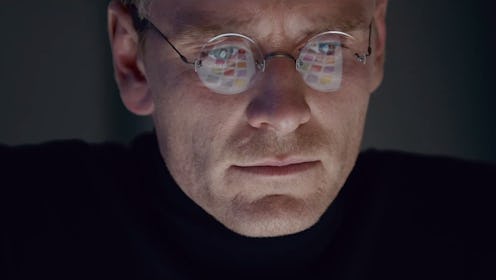
The latest cinematic exploration of the dreamer behind Apple's world tech domination hasn't even been widely released yet, but controversy has settled around Steve Jobs. The film's screenplay by The Social Network scribe Aaron Sorkin is based on Walter Isaacson's mammoth biography of the Apple co-founder, but how accurate is Steve Jobs to the man's real life and career? Well, it depends on who you ask.
Jobs himself passed away due to complications of pancreatic cancer in 2011, so there won't be a blessing of the film by its subject. But there are his co-workers and family members. In addition to Jobs (Michael Fassbender), the film includes dramatic portrayals of colleagues like business partner Steve Wozniak (Seth Rogen), marketing head Joanna Hoffman (Kate Winslet), future Apple CEO John Sculley (Jeff Daniels), Jobs' high school girlfriend Chrisann Brennan (Katherine Waterston) and Lisa Brennan-Jobs, the daughter he denied for years. Yet as for the late CEO himself, Sorkin told an audience at a New York City screening that he believes Jobs would have enjoyed the film. "I think the fact that it defies expectations in terms of the genre, that it's something a little bit new," Sorkin said. "I think he would of have appreciated that."
But that may not go for everyone. Jobs' widow Laurene Powell Jobs allegedly does not support the film. According to the Wall Street Journal, she reportedly tried to prevent it from being made by appealing to several studios that had shown interest. Her alleged concerns are in regard to the legacy of her husband, which she reportedly considers unfairly tainted by the script. Yet according to producer Scott Rudin in the WSJ , "[Powell Jobs] refused to discuss anything in Aaron's script that bothered her despite my repeated entreaties," and "continued to say how much she disliked the book, and that any movie based on the book could not possibly be accurate."
Powell Jobs did cooperate with Isaacson on his book, however. Yet as said, the screenplay does veer away from that source material considerably. For example, the role of Jobs' eldest daughter Lisa Brennan-Jobs has been beefed up; though the two did develop a relationship years after the contest of paternity that left Lisa and her mother living off of welfare while Jobs built his fortune, some people close to Jobs reportedly find the focus on this piece of his personal life to lead to an unbalanced portrayal of the man. Jobs' friend and Apple board member Bill Campbell, for instance, told WSJ that he believes "a whole generation is going to think of him in a different way if they see a movie that depicts him in a negative way" — although he admitted he hadn't seen the film.
Not everyone who knew Jobs is against the film, though. His daughter Lisa agreed to speak with Sorkin as the writer was developing the script. "She was able to tell stories about her father that weren’t necessarily flattering stories, but she would tell the story and then show me how you could see he really did love her," Sorkin told Business Insider. And then there's Steve Wozniak. The computer pioneer praised Sorkin's script and Boyle's direction in an interview with Deadline. "I saw a rough cut and I felt like I was actually watching Steve Jobs," he said.
Current Apple CEO Tim Cook added his two (billion) cents to the conversation in an interview with Stephen Colbert on The Late Show on Sept. 16. As reported by The Verge, he admitted to not having seen neither Steve Jobs nor the recent documentary Man In The Machine, but didn't let that stop him from speaking out on the artistic license he sees being applied to the life of his friend. "The Steve I knew was an amazing human being," Cook said. "I think that a lot of people are trying to be opportunistic, and I hate this." Sorkin's three-part response to that comment was given to The Hollywood Reporter during a press junket for the film:
Nobody did this movie to get rich. Secondly, Tim Cook should really see the movie before he decides what it is. Third, if you've got a factory full of children in China assembling phones for 17 cents an hour, you've got a lot of nerve calling someone else opportunistic.
The screenwriter expounded on those thoughts (and backed off a bit on the accusations) in an interview with CNBC. In the same video, Jeff Daniels comments on what he says was a completely fabricated peace-making between Jobs and his character John Sculley, who allegedly "never reconciled" in real life.
Clearly, Jobs was a polarizing, larger-than-life figure, and so it's to be expected that a film with such a strong point of view has inspired some diverse opinions.
Image: Universal Pictures; Giphy